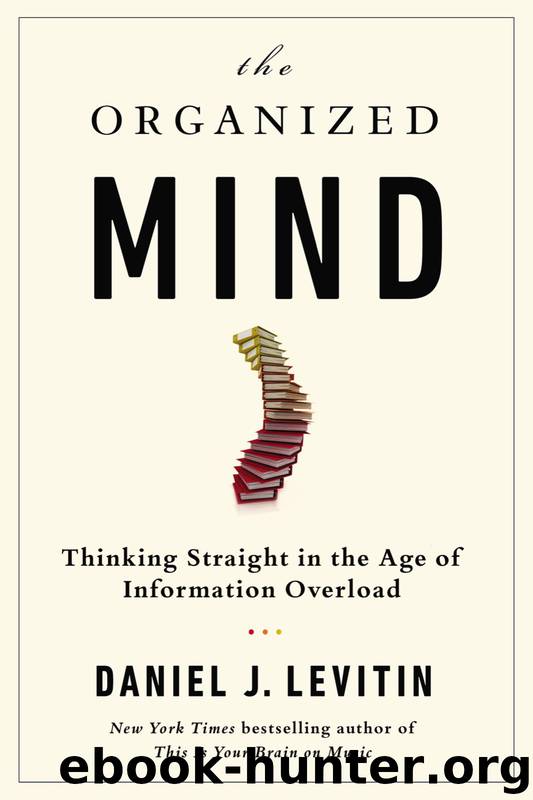Organized Mind : Thinking Straight in the Age of Information Overload (9780698157224) by Daniel J. Levitin

Author:Daniel J. Levitin
Language: eng
Format: mobi
ISBN: 9780698157224
Publisher: Penguin USA
Published: 2014-08-04T07:00:00+00:00
Alternative Medicine: A Violation of Informed Consent
One of the core principles of modern medicine is informed consent—that you have been fully briefed on all the pros and cons of any treatment you submit to, that you have been given all of the information available in order to make an informed decision.
Unfortunately, informed consent is not truly practiced in modern health care. We are bombarded with information, most of it incomplete, biased, or equivocal, and at a time when we are least emotionally prepared to deal with it. This is especially true with alternative medicine and alternative therapies.
An increasing number of individuals seek alternatives to the professional medical-hospital system for treating illness. Because the industry is unregulated, figures are hard to come by, but The Economist estimates that it is a $60 billion business worldwide. Forty percent of Americans report using alternative medicines and therapies; these include herbal and homeopathic preparations, spiritual or psychic healing practices, and various nonmedical manipulations of body and mind with a healing intent. Given its prominence in our lives, there is some basic information anyone consenting to this kind of health care should have.
Alternative medicine is simply medicine for which there is no evidence of effectiveness. Once a treatment has been scientifically shown to be effective, it is no longer called alternative—it is simply called medicine. Before a treatment becomes part of conventional medicine, it undergoes a series of rigorous, controlled experiments to obtain evidence that it is both safe and effective. To be considered alternative medicine, nothing of the kind is required. If someone holds a belief that a particular intervention works, it becomes “alternative.” Informed consent means that we should be given information about a treatment’s efficacy and any potential hazards, and this is what is missing from alternative medicine.
To be fair, saying that there is no evidence does not mean that the treatment is ineffective; it simply means its effectiveness has not yet been demonstrated—we are agnostic. But the very name “alternative medicine” is misleading. It is alternative but it is not medicine (which begs the question What is it an alternative to?).
How is science different from pseudoscience? Pseudoscience often uses the terminology of science and observation but does not use the full rigor of controlled experiments and falsifiable hypotheses. A good example is homeopathic medicine, a nineteenth-century practice that entails giving extremely small doses (or actually no dose at all) of harmful substances that are claimed to provide a cure. It is based on two beliefs. First is that when a person shows symptoms such as insomnia, stomach distress, fever, cough, or tremors, administering a substance which, in normal doses, causes those symptoms, can cure it. There is no scientific basis for that claim. If you have poison ivy, and I give you more poison ivy, all I’ve done is given you more poison ivy. It is not a cure—it is the problem! The second belief is that diluting a substance repeatedly can leave remnants of the original substance that are active
Download
This site does not store any files on its server. We only index and link to content provided by other sites. Please contact the content providers to delete copyright contents if any and email us, we'll remove relevant links or contents immediately.
Nudge - Improving Decisions about Health, Wealth, and Happiness by Thaler Sunstein(7684)
Deep Work by Cal Newport(7053)
Principles: Life and Work by Ray Dalio(6394)
The Doodle Revolution by Sunni Brown(4736)
Factfulness: Ten Reasons We're Wrong About the World – and Why Things Are Better Than You Think by Hans Rosling(4727)
Eat That Frog! by Brian Tracy(4507)
Thinking in Bets by Annie Duke(4210)
Hyperfocus by Chris Bailey(4107)
Visual Intelligence by Amy E. Herman(3771)
Writing Your Dissertation in Fifteen Minutes a Day by Joan Bolker(3712)
Ogilvy on Advertising by David Ogilvy(3587)
Hidden Persuasion: 33 psychological influence techniques in advertising by Marc Andrews & Matthijs van Leeuwen & Rick van Baaren(3540)
How to Win Friends and Influence People in the Digital Age by Dale Carnegie & Associates(3537)
How to win friends and influence people by Dale Carnegie(3464)
The Pixar Touch by David A. Price(3424)
Schaum's Quick Guide to Writing Great Short Stories by Margaret Lucke(3368)
Deep Work: Rules for Focused Success in a Distracted World by Cal Newport(3217)
Work Clean by Dan Charnas(3108)
The Slow Fix: Solve Problems, Work Smarter, and Live Better In a World Addicted to Speed by Carl Honore(2995)
